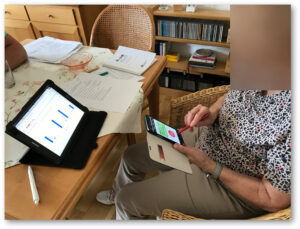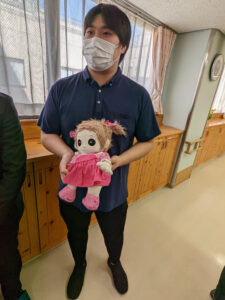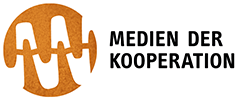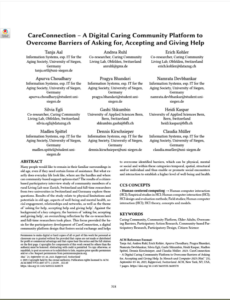A05 - The Cooperative Creation of User Autonomy in the Context of the Ageing Society
Katerina Cerna
Dr. Marén Schorch
(Associate Member)
„The subproject researches and co-produces autonomy-enhancing socio-technical infrastructures for sensor-based telecare and telemedicine applications for community care in Germany and Japan.“
Executive Summary
The socio-informatic subproject A05 investigates cooperative, practice-based approaches to designing autonomy-enhancing media infrastructures for aging societies. The research addresses practices of media appropriation and media design for and with the elderly, their relatives, volunteers, and professionals in care and medicine. The first phase of the project focused on fundamental socio-technical aspects of the cooperative design of appropriation infrastructures in their interconnectedness with media practices. The project ethnographically traced factors such as imaginaries of technology and the way the elderly are conceived (and conceive themselves) as technology users. It moreover considered the influence of these factors on participation-promoting, media-related processes of co-production. During the second project phase, the initial research questions were carried over to community-based co-production and appropriation aspects of caring communities. In cooperation with local Swiss caring community initiatives, the project explored design conditions in a participatory bottom-up process, cooperatively designing and developing various analog and digital measures. This included a digital platform that supports elderly people and members of caring communities in finding tailored information and referrals for different help scenarios.
The third phase will maintain the focus on autonomy-enhancing appropriation infrastructures in and of caring communities. However, this phase will foreground the aspect of nursing and medical care through sensor-based telecare and telemedicine applications in community settings. The area of concentration is therefore cooperative design and appropriation processes employed in media, data, and sensory practices in therapist-technology-patient triads in order to identify potential ways to enhance the autonomy of the users. In this respect, data collection, sensing, and telemedicine applications play just as much a role as cooperative practices of sense-making of the collected data. The subproject adopts an anticipatory perspective of technology design and considers current controversies and care scenarios of the future. After investigating local caring communities in the context of national strategies in Switzerland and comparing them with German approaches in the second phase, the third phase will conduct comparative studies with Japanese approaches of community-based integrated care as an appropriate next step. These approaches seek to provide elderly care in the context of national strategies of “Society 5.0” as a combined community-based and ehealth-based effort. Japanese approaches to care target, among other things, scenarios of networked smart homes and robotics. Such a vision has been further developed in Japan than in Germany. The contribution of A05 aims at empirical, conceptual, and prototypical results which, like the qualitative research of CSCW and HCI, focus on the specific characteristics of healthcare work (including physical, relationship, and emotional work) and consider them under new conditions of human-technology interaction. Moreover, the research will focus on social and cultural barriers, including fears of loss of autonomy and privacy or loneliness in one’s own home, and new forms of (relationship) work and cooperation that are necessary for the implementation of innovative socio-technical healthcare infrastructures. In this way, the subproject seeks to contribute to improving our understanding of complex cooperation problems and solutions in real-life situations and of the way the relationships between senses and sensors, or corporeality and technology are changing. A05 takes up the concepts of boundary objects, social worlds, and arenas and focuses on boundary practices, i.e. the active generation of material and symbolic boundaries in spatial, temporal, and social terms. It also addresses the way these boundaries change, shift, and become blurred or renegotiated due to modified socio-technical practices, among other things with a view to the emergence of new professions and care agencies.
Research questions
The focus of our research within the 3rd phase of the Collaborative Research Center is on sensor media. We are investigating these theoretically and practically within and outside community-based settings with regard to their appropriation structures for people of advanced age or those with increased support needs in the contexts of care and health prevention. Here, media, data and sensory practices as well as possible and necessary interfaces are researched against the background of telecare and telemedicine applications in cooperative situations.
As part of this research project, we are addressing the following questions, among others:
- How do sensor media shape cooperation in community care settings?
- How do sensor media affect autonomy in the private home and in healthcare work?
- Which competencies of the users do sensor media promote and demand?
Socio-technical design objectives
The socio-technical design objectives of our research are the promotion of cooperation and the strengthening of user autonomy against the background of the development of design proposals and prototypes for telehealth applications.
In addition, we would like to contribute to the further development of socio-informatic methods and concepts.
We gain access to the field through existing networks in Germany and at the German Institute for Japanese Studies in Tokyo.

(© Claudia Müller)
The project combines ethnography, action research and design approaches for the co-production of sensor-based telehealth applications with patients in their immediate living environment as well as with healthcare staff in their everyday working lives.
More specifically, design proposals and prototypes are developed using participatory design methods, in particular using the approaches of Participatory Action Research (PAR) (Cerna, K., Müller, C., Randall, D., & Hunker, M. (2022). “Situated scaffolding for sustainable participatory design: learning online with older adults”. Proceedings of the ACM on human-computer interaction, 6(GROUP), 1-25) and Community-Based Participatory Research (CBPR) (Müller, C., Hornung, D., Hamm, T. and Wulf, V. 2015. “Measures and Tools for Supporting ICT Appropriation by Elderly and Non Tech-Savvy Persons in a Long-Term Perspective”. ECSCW 2015: Proceedings of the 14th European Conference on Computer Supported Cooperative Work, 19-23 September 2015, Oslo, Norway. N. Boulus-Rødje, G. Ellingsen, T. Bratteteig, M. Aanestad, and P. Bjørn, eds. Springer International Publishing. 263–281), i.e. involving co-researchers from multiple relevant stakeholder groups, e.g. scientists, practitioners, caregivers, family caregivers and other lay people (volunteers).
Empirical methods used in this regard are semi-structured interviews and domestic observations, which are ethnographically collected over several weeks, comparing Germany and Japan. Furthermore, interactive methods such as cultural and technology probes (Gaver et al. 1999; Müller et al. 2023) or interactive, multimedia diaries or language books (including self-collected video and image data) (Martin et al. 2012) are used in the empirical phase. With regard to the home-based long-term study, the focus is particularly on the integration of telecare and telemedicine applications at home and the protection of users' privacy. Furthermore, anticipatory methods from the spectrum of critical and speculative design, e.g. design fiction, are used with regard to collaborative prototyping for the co-production of well-being-oriented future scenarios.
With regard to the further development of a socio-informative method and concept development, we are guided by the design case study and grounded design approach.
Such a participatory approach takes place in all phases (preliminary study, design, appropriation/evaluation) of the study.
WP 1: Context studies on health media in community care
In addition to the evaluation of existing appropriation studies of telemedicine and telecare applications by older people with references to community approaches, the social discourses on telemedicine and telecare for the care of older people will be reconstructed internationally on the basis of existing studies. Furthermore, own qualitative preliminary studies are conducted by means of participant observation and semi-standardized interviews in Germany and Japan in order to survey appropriation and cooperation practices around telecare and telemedicine applications.
WP 2: Participatory exploration of community telehealth technologies
A Real-World-Living Lab (see www.praxlabs.de) will be set up to investigate concrete appropriation processes of telemedicine and telecare applications by older people, consisting of households and working environments of the providers to be investigated. As part of the long-term study planned here, regular workshops with the household members are planned, for which interactive research methods from the field of HCI will be used, such as design fiction and collaborative prototyping, in order to iteratively explore the connections and interplay or defense of technical and human sensor technology, i.e. of senses and sensors, based on the data collected in advance by the participants.
WP 3: Participatory design of interfaces and infrastructures
In co-design workshops, new prototype solutions, interfaces and infrastructures are developed that bring together senses and sensor technology for all those involved in the use of telemedicine/care in a successful way. A series of co-creation sessions is planned with the Praxlabs households and other stakeholders from the healthcare sector.
These design products as negotiation artifacts (Müller et al. 2012) form the basis for further iteration loops in subsequent workshops.
WP 4: Theory and concept work studies in international comparison
In the sense of an ongoing development of a corpus of design case studies for the application area "IT for the ageing society", the developed results are examined, i.e. analyzed and evaluated for relevant cross-cutting topics that contribute to a corpus formation for medium-range concepts and theories.
In addition to ensuring sustainability for the co-researchers, continuous intensive public relations and networking work takes place at regional and supra-regional level as well as in the national context in order to contribute (to a modest extent) to current discourses on community-oriented healthcare and professionalization discourses in care.

(© Claudia Müller)
➔ Find the Project Archive 2020–2023 here
Publications
Current
CareConnection – A Digital Caring Community Platform to Overcome Barriers of Asking for, Accepting and Giving Help
Many people would like to remain in their familiar surroundings in old age, even if they need certain forms of assistance. But what exactly does everyday life look like, where are the hurdles and where can community-based support options start? The results of a citizen-based participatory interview study of community members of a rural Living Lab near Zurich, Switzerland and full-time researchers from two universities in Switzerland and Germany explore these questions.
Results of the study relate to physical limitations and potentials in old age, aspects of well-being and mental health, social engagement, relationships and networks, as well as the theme of ‘asking for help, accepting help and giving help’. Against the background of a key category, the barriers of ‘asking for, accepting and giving help’, an overarching reflection by the co-researchers and full-time researchers took place. This focus provided the basis for the participatory development of CareConnection, a digital community platform design that fosters social exchange and helps to overcome identified barriers, which can be physical, mental or social and within these categories temporal, spatial, structural and/or individual and thus enable or promote social encounters and interaction to establish a higher level of well-being and health.
Tanja Aal, Andrea Ruhl, Erich Kohler, Apurva Choudhary, Pragya Bhandari, Namrata Devbhankar, Silvia Egli, Gashi Shkumbin, Heidi Kaspar, Madlen Spittel, Dennis Kirschsieper, and Claudia Müller. 2023. “CareConnection – A Digital Caring Community Platform to Overcome Barriers of Asking for, Accepting and Giving Help”. In Proceedings of Mensch und Computer 2023 (MuC '23). Association for Computing Machinery, New York, NY. 318–324. DOI: https://doi.org/10.1145/3603555.3608578.



